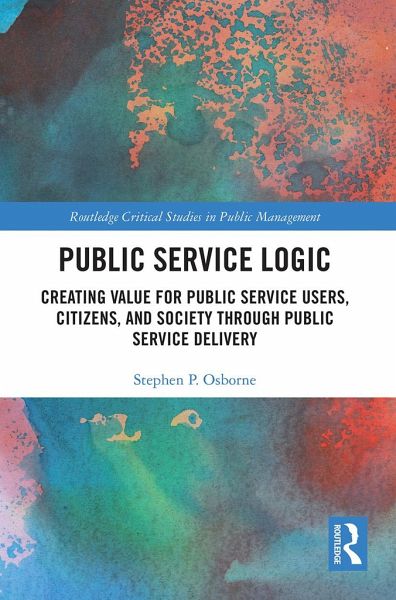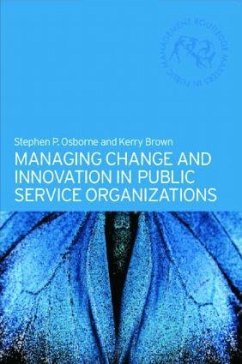"The transition of public services from a product-dominant to a service-dominant logic has been a profound harbinger of the transition of government-centered to people-centered governance. Stephen Osborne, by elucidating these transitions with theoretical imaginations and inspirations, provides a new anchor of public administration and management studies." Professor Yijia Jing, Changjiang Scholar, Chair of Public Administration, and Dean of the Institute for Global Public Policy at Fudan University, Shanghai, China.
"This important book is theoretically and conceptually rich and innovative. It is a significant contribution to our knowledge about public service management. It offers a new approach to the
theory and practice of managing and reforming public services. This book is a must read for anyone who wants to understand how to organize for public service delivery."
Professor Emeritus Per Lægreid,
Chair of Public Administration and Organization Theory in the Department of Administration and Organization Theory at the University of Bergen, Norway"This is a truly compelling book, which clearly and comprehensively explains the profound implications of adopting a post-industrial perspective on public service production. Decades of efficiency-driven reforms have failed to enhance the impact of public services due to the myopic view of citizens as the users or consumers of public services delivered by public line production. The book urges the adoption of an entirely new perspective on service production that stresses the active role of citizens in co-producing the value of public services through interaction with public service providers. It represents a promising step toward reaping the fruits of public services in the 21
st Century."
Professor Jacob Torfing, Chair of Politics and Institutions and Research Director of the Roskilde School of Governance, in the Department of Social Sciences and Business, Roskilde University, Denmark"This highly readable book substantially advances our theoretical understanding of how public services can and should be delivered. It is likely to be a topic of discussion for years to come."
Professor Taco Brandsen,
Chair of Comparative Public Administration, Department of Public Administration, Radboud University, Nijmegen, The Netherlands"A transformative, extremely timely and enlightening read, Stephen Osborne has produced the go-to text on Public Service Logic. From its origins, through its evolution and role for service value (co)creation, to the critical future research directions for the public administration and management field, the book is comprehensive in its coverage. Given the centrality of Public Service Logic to the public services of today and tomorrow, this is an essential resource for students, public service practitioners and scholars alike"
Professor Ian R Hodgkinson, Chair of Strategy in the International Business, Strategy, and Innovation Group of the School of Business and Economics, Loughborough University, UK"Stephen Osborne's new book is a stunning intellectual and practical achievement. He argues that the core of public service should be the co-creation with citizens of public services and public value. His Public Service Logic in turn illuminates an invaluable approach for enhancing what we all should want in governance, citizenship, and value-creating public service."
Professor John Bryson, McKnight Presidential Professor of Planning and Public Affairs in the Hubert H. Humphrey School of Public Affairs at the University of Minnesota, USA"Professor Osborne's new book represents a major step forward for the theory and practice of Public Administration & Management. It rekindles our research field, providing a human and community-centered view that offers a tailored approach to public policy design and implementation. The book illustrates, with practical examples, the crucial role played by public service users, citizens, and society in the generation or destruction of value. In this perspective, public policy and public service management are not framed as a mere administrative processes, but rather as means to make the societal values underlying public services explicit. Written in an approachable style and with a wealth of examples, this volume provides a source of learning for a wide variety of readers, even beyond the academic field."
Professor Carmine Bianchi, Chair of Public Management & Governance in the Faculty of Political Sciences, University of Palermo, Italy"Stephen Osborne notes that while public services are a key feature of all modern societies, they continue to view citizens at the periphery - as end users, rather than central to the public service delivery process. He argues that to effectively address complex social and economic needs, public service delivery must move beyond its "product-dominant concepts and approaches" to focus on creating value for all stakeholders. The book offers an accessible summary of public service theory, policy and reform and a vision for moving to a model of negotiated public service value for all. It's a must read for students, academic scholars, policy makers, public managers, and anyone interested in understanding the limits and potential of public service delivery in contemporary society."
Professor Mary K. Feeney, Lincoln Chair of Ethics in Public Affairs, School of Public Affairs, Arizona State University"Stephen Osborne's book provides us with a complete insight into a new and user-oriented approach to public service delivery and does so in an elegant and comprehensive way. The book puts users at the core of public services and provides a telling text to elaborate the consequences of this. Highly recommended."
Professor Erik-Hans Klijn,
Chair of Public Administration in the Department of Public Administration and Sociology, Erasmus University, Rotterdam"In his latest book, Osborne mounts a powerful argument against the flaws and failings that have characterised the theory and practice of public services over the last few decades. Built on narrow foundations, public services in many parts of the world have been focused too much on efficiency and not enough on being solutions to problems or value creating activities. He explains how the many attempts to reform public services, based on these existing logics, have failed to realise their aspirations. Comprehensive in its argument and radical in its vision, the core ideas of
Public Service Logic have the potential to reshape and revolutionize how we think about and enact public services. Like his previous works, Osborne's latest will push us to look at core questions of public administration and management in new ways and challenge us to take a new and exciting agenda forward."
Professor Janine O'Flynn,
Chair of Public Management, Melbourne School of Government, University of Melbourne, Australia"Shifting from a Public
Sector Logic to a Public
Service Logic is essential to ensure effective public service delivery. Osborne's book unpacks a comprehensive range of logics to understand public service delivery including marketing, creating value, and production processing. This book is an eye-opener for theory and practice since it develops an alternative Public Service Logic which we desperately need, even more in times of chronical crises."
Professor Geert Bouckaert,
Chair of Public Governance in the Public Governance Institute, KU Leuven, Belgium"Based on research into service management and marketing, service-dominant logic and critical service logic, and combined with his profound knowledge of public administration management (PAM) Stephen Osborne makes a compelling case for adopting a new approach to PAM, where policy makers, strategists, public service managers, citizens as public service users, other stakeholders and the society at large interact in processes of value creation and co-creation. Illustrative cases are offered as examples. This book should be important reading not only for public management researchers but equally much for policy makers, PSO managers, public service managers and everyone engaged with the development and management of PSOs and public services."
Professor Christian Gronroos,
Emeritus Chair of Marketing, Hanken School of Economics, Helsinki"Reforming public service delivery is one of key agendas for practitioners and scholars so that various waves of national and global public service reforms have attempted to improve the economy and other values. Stephen Osborne argues that overall reformative waves have failed to make a substantive shift in the impact of these vital services upon public service users, the wider citizenry and society. Based on his in-depth analysis about the evolution of public service logic, he explains the nature of the public service ecosystem as a process and shows us a new eye-opening window to improve such processes through co-design, co-production, co-experience, and co-construction." Professor Pan Suk Kim,
Chair of Public Administration and International Director of the American Society for Public Administration. Former Minister of Personnel Management of the Republic of Korea















